Overview
Developers often encounter significant challenges when debugging code, which can hinder their efficiency and innovation. Kodezi addresses these issues by automating the identification and resolution of coding problems. This powerful tool not only accelerates debugging processes—reporting up to a 40% reduction in manual debugging time—but also enhances overall code quality and fosters team collaboration.
By utilizing Kodezi, developers can shift their focus from tedious debugging tasks to more strategic initiatives, leading to improved productivity and faster delivery of software products. Imagine the potential for your team when coding issues are resolved swiftly and effectively!
Furthermore, Kodezi's automation capabilities allow for a more streamlined development process, ensuring that teams can work together more efficiently. This results in higher quality code and a more cohesive development environment.
Are you ready to transform your coding practices? Explore the tools available on Kodezi's platform and discover how you can enhance your development workflow today.
Introduction
In a world where coding complexities can hinder even the most seasoned developers, the emergence of AI bug-fixing systems presents a promising solution. These innovative tools streamline the debugging process, allowing teams to concentrate on strategic development instead of becoming bogged down by persistent issues. As organizations seek to accelerate and enhance software delivery, one question arises: how can AI-driven solutions like Kodezi reshape the software development landscape and boost productivity to unprecedented heights?
Furthermore, Kodezi addresses these challenges through its unique features designed to improve efficiency. By automating the debugging process, it not only saves time but also enhances code quality. In addition, teams can leverage Kodezi to minimize errors and focus on delivering high-quality software.
The benefits of using Kodezi are clear:
- Improved productivity
- Higher code quality
- A more streamlined development process
As developers, have you considered how such tools can transform your coding practices? By exploring the features available on the Kodezi platform, you can unlock new levels of efficiency and effectiveness in your work.
Kodezi | Professional OpenAPI Specification Generator - AI Dev-Tool: Automate Bug Fixing for Enhanced Efficiency
Developers often face significant coding challenges that can hinder their productivity, which can be addressed using an AI bug fixing system. The CLI tool stands out as a professional OpenAPI specification generator, addressing these challenges effectively. It independently improves quality and resolves bugs before they reach production, which significantly enhances development efficiency. By utilizing an AI bug fixing system to automatically detect and address issues, it allows developers to focus on more strategic tasks rather than getting bogged down in debugging.
Furthermore, this automation not only accelerates the development process but also guarantees high programming quality. The CLI consistently observes and addresses issues as they arise, ensuring a smooth workflow. Imagine being able to concentrate on creating innovative solutions instead of wrestling with persistent bugs, thanks to an AI bug fixing system.
In addition, for those eager to experience its capabilities firsthand, a '5 minute quickstart' is available, along with a demo to showcase its features. By exploring these tools on the platform, developers can unlock improved productivity and elevate their coding practices. Why not take the first step towards a more today?
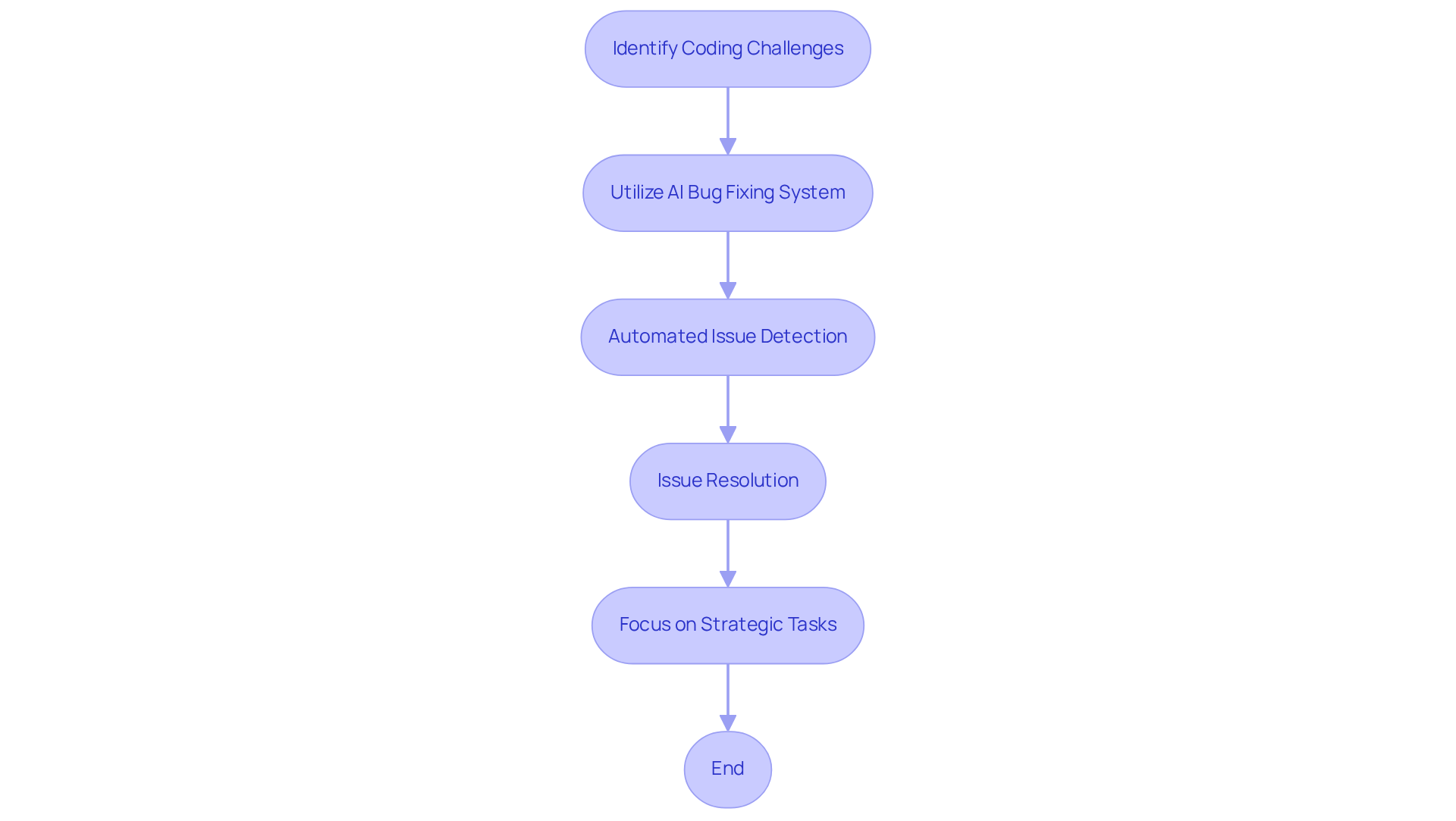
Manage Code Complexity: The Role of AI Bug Fixing Systems in Modern Development
Coding challenges can be daunting for developers, especially when navigating complex systems. The role of [AI bug fixing systems](https://blog.kodezi.com/10-ways-ai-integrated-development-environments-boost-developer-efficiency) is crucial in managing this complexity by automating the identification of problematic areas within the software repository. Kodezi addresses these challenges effectively with its automated programming debugging features, which enable users to quickly recognize and resolve codebase issues. Furthermore, its entropy detection feature uncovers risk zones, allowing teams to proactively tackle potential problems before they escalate.
By utilizing Kodezi, developers can significantly enhance their productivity and code quality. This method simplifies the upkeep of intricate systems while greatly improving overall software stability and reliability. Imagine addressing performance bottlenecks, identifying security issues, incorporating exception handling, and improving formatting—all contributing to cleaner, more secure implementations. Ultimately, this leads to reduced technical debt and a more efficient development process.
Are you ready to elevate your coding practices? Explore the tools available on Kodezi’s platform and experience the benefits of an AI bug fixing system for a streamlined approach to debugging and maintenance. With comprehensive explanations and insights into what occurred and how it was corrected, Kodezi empowers developers to .
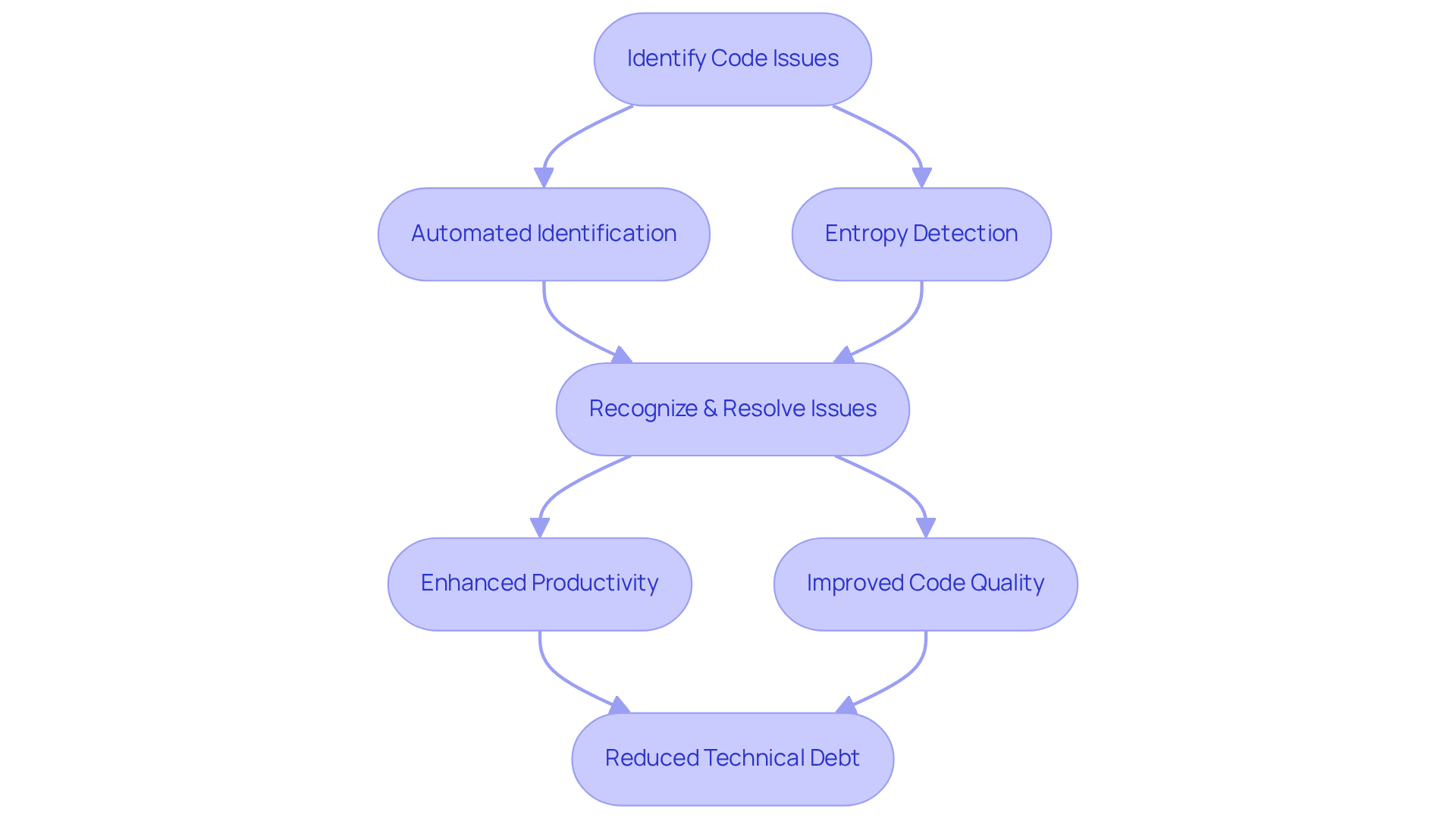
Save Time: Accelerate Debugging Processes with AI Solutions
Debugging can be a significant challenge for developers. How often have you found yourself bogged down by errors that seem to multiply? Fortunately, AI tools like Kodezi are transforming this landscape by functioning as an AI bug fixing system that automates the identification and fixing of errors. This automation, through an AI bug fixing system, can reduce manual debugging time by up to 40%, as reported by Forrester, allowing developers to shift their focus from merely fixing issues to driving feature development and innovation.
Furthermore, Kodezi's autonomous features empower B2B engineering groups to enhance code quality and leverage the AI bug fixing system to resolve issues before they reach production. Users have reported that Kodezi, an AI bug fixing system, allows them to find and fix bugs faster and more easily than with traditional methods. One user even described it as a "lifesaver" for correcting issues. The benefits of using Kodezi are clear: improved productivity and higher code quality are within reach.
In addition, generative AI tools such as GitHub Copilot and DeepCode are proving to be game-changers for teams, often acting as an AI bug fixing system that completes debugging tasks that previously took hours in mere minutes. Developers using Copilot have reported a remarkable 55% boost in coding speed, showcasing the transformative impact of these technologies on software development workflows.
Similarly, tools like Facebook's Sapienz and Microsoft's Visual Studio Code integration illustrate how the AI bug fixing system not only streamlines debugging processes but also enhances overall productivity. This allows organizations to accelerate the delivery of updates and new features, ultimately strengthening their competitive edge in the market. Why not on the Kodezi platform and see how they can elevate your coding practices?
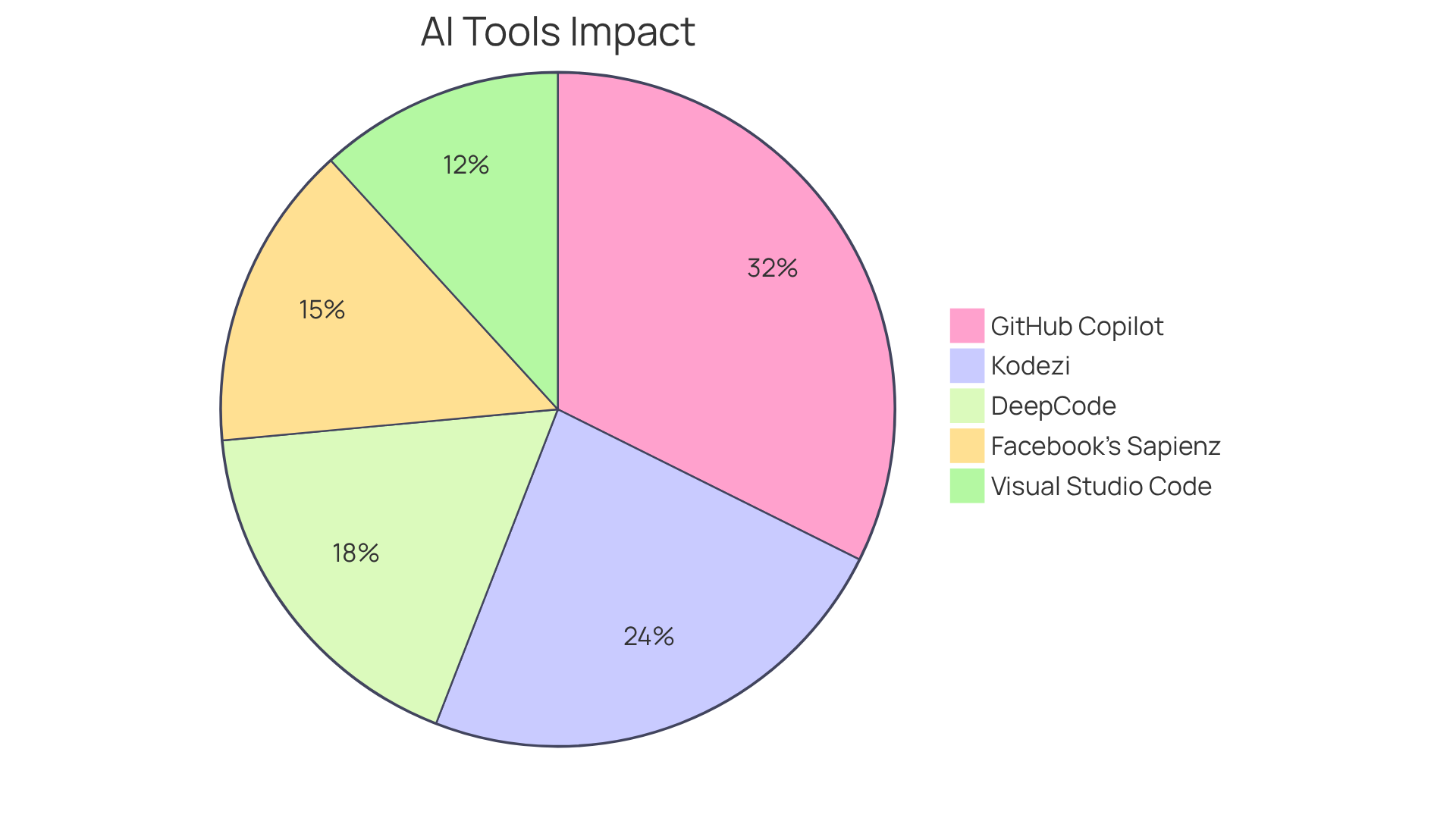
Maintain Code Quality: Continuous Monitoring and Bug Fixing
Coding challenges can often seem daunting for developers. Ongoing supervision is crucial for maintaining the quality of AI bug fixing systems over time. Kodezi addresses these challenges by independently managing codebases, quickly detecting and correcting issues as they emerge. This proactive approach not only but also ensures that applications remain resilient and production-ready. Furthermore, Kodezi's AI-driven programming tool examines bugs and enhances your scripts by producing insightful comments, ultimately boosting overall productivity.
By maintaining high standards of programming quality, teams can significantly reduce the likelihood of critical failures. This improvement leads to enhanced user satisfaction. In fact, organizations that implement an AI bug fixing system for ongoing bug fixing report a notable increase in software delivery throughput, with 59% of professionals acknowledging a positive influence on code quality. As AI tools advance, they simplify the development process and promote a culture of ongoing enhancement. This makes them essential for contemporary engineering groups.
Are you ready to elevate your coding practices? Explore the tools available on Kodezi's platform and experience the benefits of improved productivity and code quality.
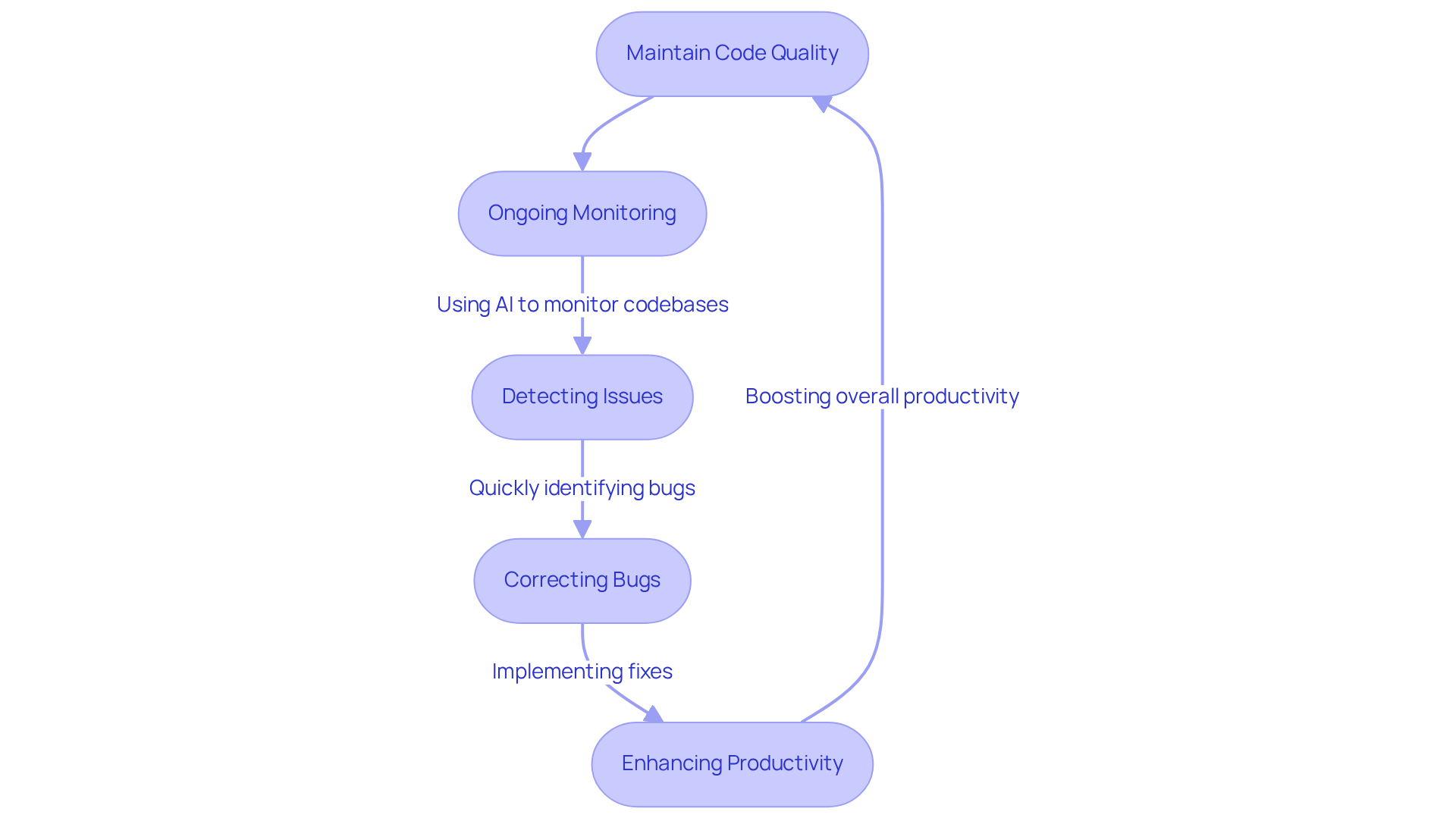
Enhance Team Collaboration: AI Bug Fixing as a Shared Resource
Coding challenges can often hinder developers' productivity and collaboration. AI bug fixing systems, such as Kodezi OS, are essential tools that improve group collaboration by automating bug fixes and delivering insights in environments like Slack and GitHub. By ensuring that all members are informed and aligned, Kodezi fosters transparency, which in turn enhances communication and nurtures a collaborative culture. This enables teams to work together effectively towards common goals.
Moreover, the incorporation of AI tools into development processes significantly changes group dynamics. Teams utilizing Kodezi OS have reported a remarkable 30% decrease in bug resolution time, showcasing its efficiency in improving communication and collaboration. Users have expressed their satisfaction with the platform; one stated, 'This tool has assisted me in more quickly and simply than attempting to do it manually.' Another user remarked, 'I love what this platform is doing with debugging; it feels like I just unlocked a new superpower!'
Additionally, tech lead Todd Ariss highlighted, 'AI isn’t here to replace our group but to enhance what makes us exceptional,' emphasizing AI's role in fostering an engaged and empowered environment. To effectively utilize an AI bug fixing system such as Kodezi, groups should seamlessly incorporate it into their daily workflows. This encourages open communication and collaboration across all levels, ultimately leading to improved productivity and code quality.
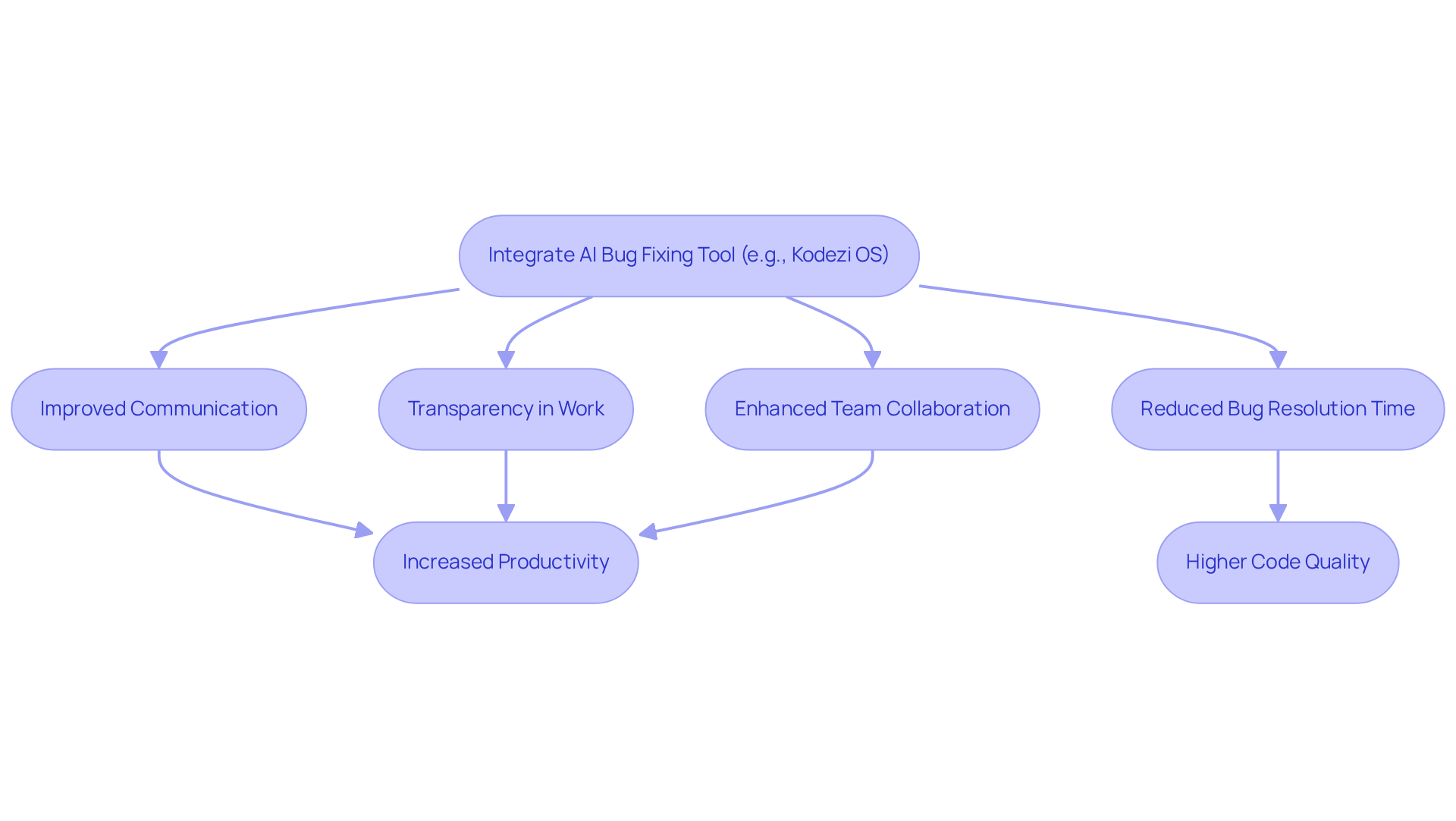
Leverage Historical Data: AI Learning for Proactive Bug Fixing
Developers often face significant challenges in maintaining code quality and resolving bugs efficiently. AI bug fixing systems utilize historical data to inform proactive strategies for addressing these issues, as seen with Kodezi. By autonomously enhancing code quality, the CLI resolves problems before they reach production, learning from previous pull requests, CI failures, and commits. This capability allows it to anticipate and address potential issues proactively.
The data-driven approach employed by Kodezi enhances the and incorporates an AI bug fixing system that empowers teams to make informed decisions based on historical trends and patterns. By examining past bug resolutions, the CLI improves its predictive abilities, greatly boosting resolution rates and minimizing the chances of recurring issues. Furthermore, machine learning algorithms study previous bug solutions, evolving over time to provide better recommendations.
As AI continues to advance, its ability to leverage past data will be crucial in fostering a more efficient and reliable software development lifecycle. Imagine the productivity gains when teams can focus on innovation rather than constantly troubleshooting bugs. Explore the tools available on the Kodezi platform to enhance your coding practices and improve overall code quality.
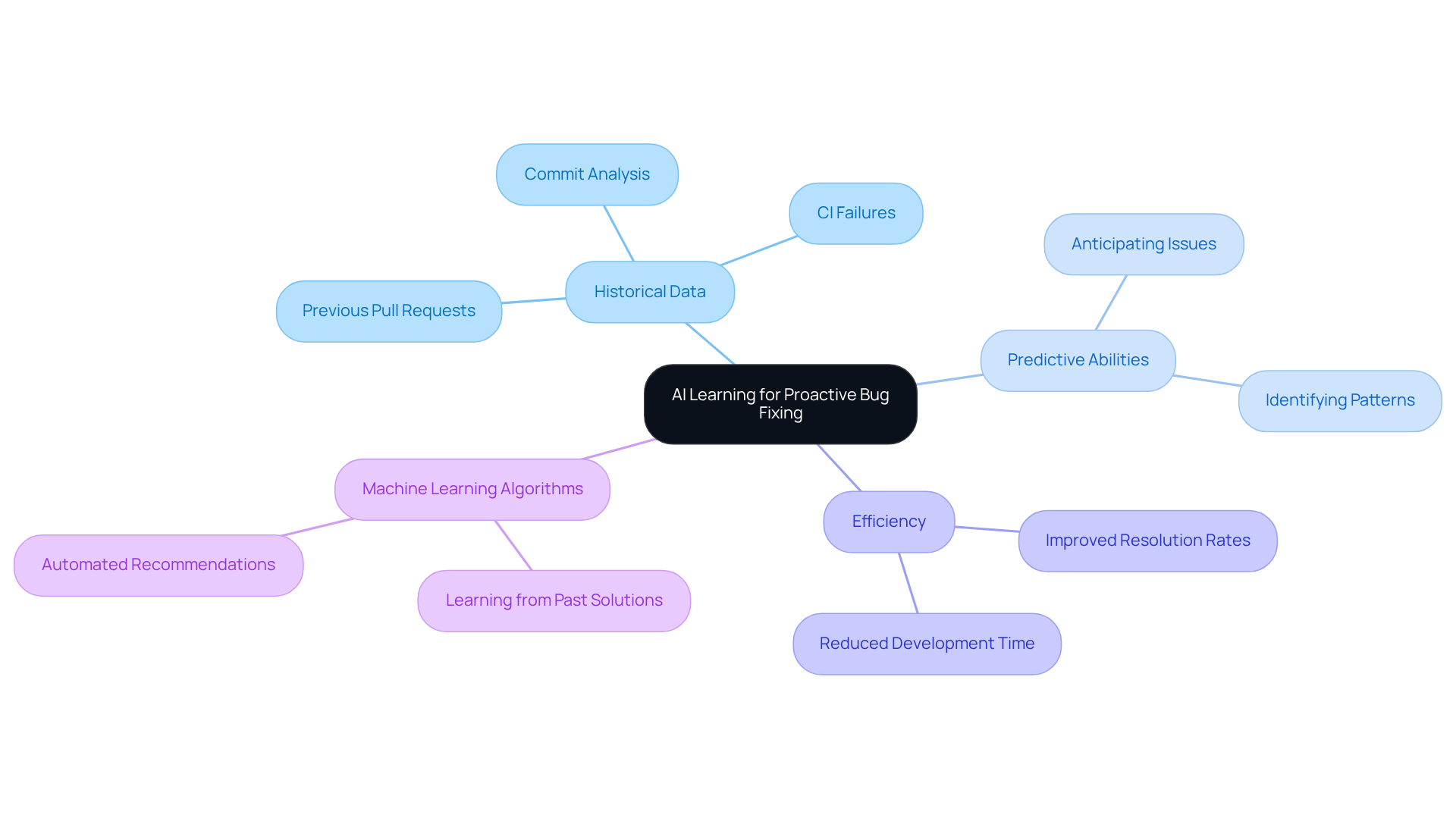
Integrate Seamlessly: AI Bug Fixing Systems with Development Tools
Coding challenges are a common hurdle for developers, often leading to inefficiencies and delays. The seamless integration of the AI bug fixing system with existing development tools is essential for maximizing effectiveness. Kodezi addresses these challenges through its CLI, which autonomously enhances codebases and resolves issues before they reach production. By directly integrating with GitHub, CI/CD pipelines, and observability platforms, Kodezi allows teams to incorporate an AI bug fixing system into their workflows without disruption. This compatibility enables developers to leverage AI capabilities without overhauling their processes.
The benefits of using Kodezi are significant. Developers have noted that such integration streamlines workflows and significantly enhances productivity. For instance, organizations utilizing Kodezi report reclaiming substantial time for their developers, leading to faster development cycles and improved software quality. By incorporating AI into daily operations, teams can focus more on innovation and less on routine upkeep, ultimately enhancing efficiency in software development. Furthermore, Kodezi provides a quick 5-minute start and demonstration, making rapid implementation straightforward.
As Ginni Rometty, former CEO of IBM, stated, 'AI will not replace humans, but those who use AI will replace those who don't.' This highlights the . However, it is crucial to approach AI integration responsibly, as leaders like Bill Gates and Elon Musk emphasize the potential risks associated with AI advancements. Are you ready to explore the tools available on Kodezi's platform and transform your coding practices?
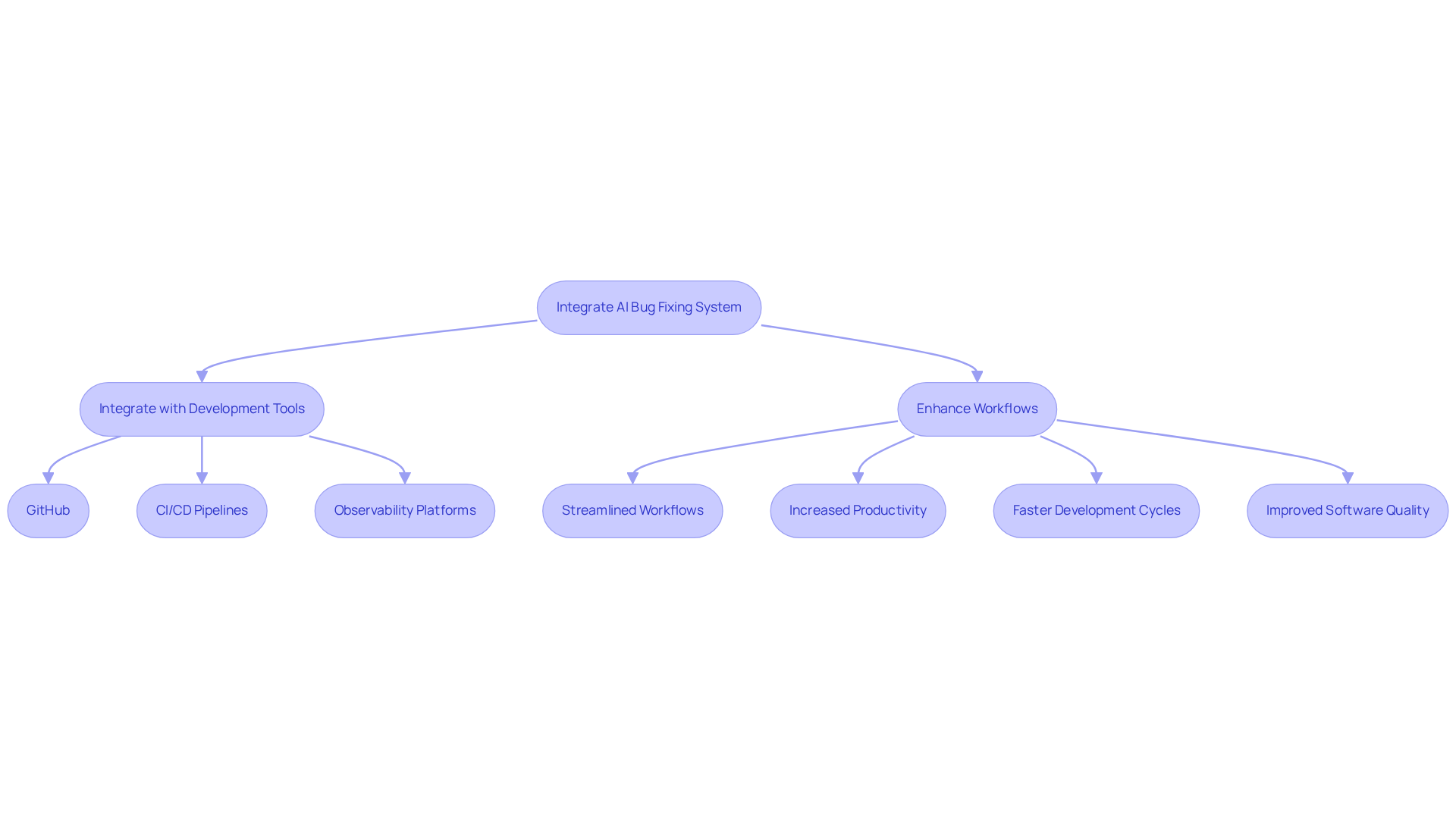
Reduce Technical Debt: Proactive Bug Management with AI
Proactive bug management through an AI bug fixing system like Kodezi CLI is essential for addressing the coding challenges that developers face, particularly in minimizing technical debt within B2B engineering teams. How often do unresolved software issues accumulate, leading to significant technical debt over time? By independently enhancing software quality and correcting errors before deployment, Kodezi CLI serves as an AI bug fixing system that empowers teams to prevent the buildup of these problems.
This proactive approach not only keeps codebases organized but also allows teams to utilize an AI bug fixing system for . As a result, developers can focus on innovation rather than continuously tackling legacy issues. Imagine the productivity gains when your team can shift its attention from fixing bugs to creating new features.
Furthermore, Kodezi's capabilities help improve overall code quality, leading to smoother workflows and enhanced collaboration. By utilizing this tool, engineering groups can streamline their processes and foster a culture of continuous improvement. Explore the tools available on the Kodezi platform and discover how they can transform your coding practices.
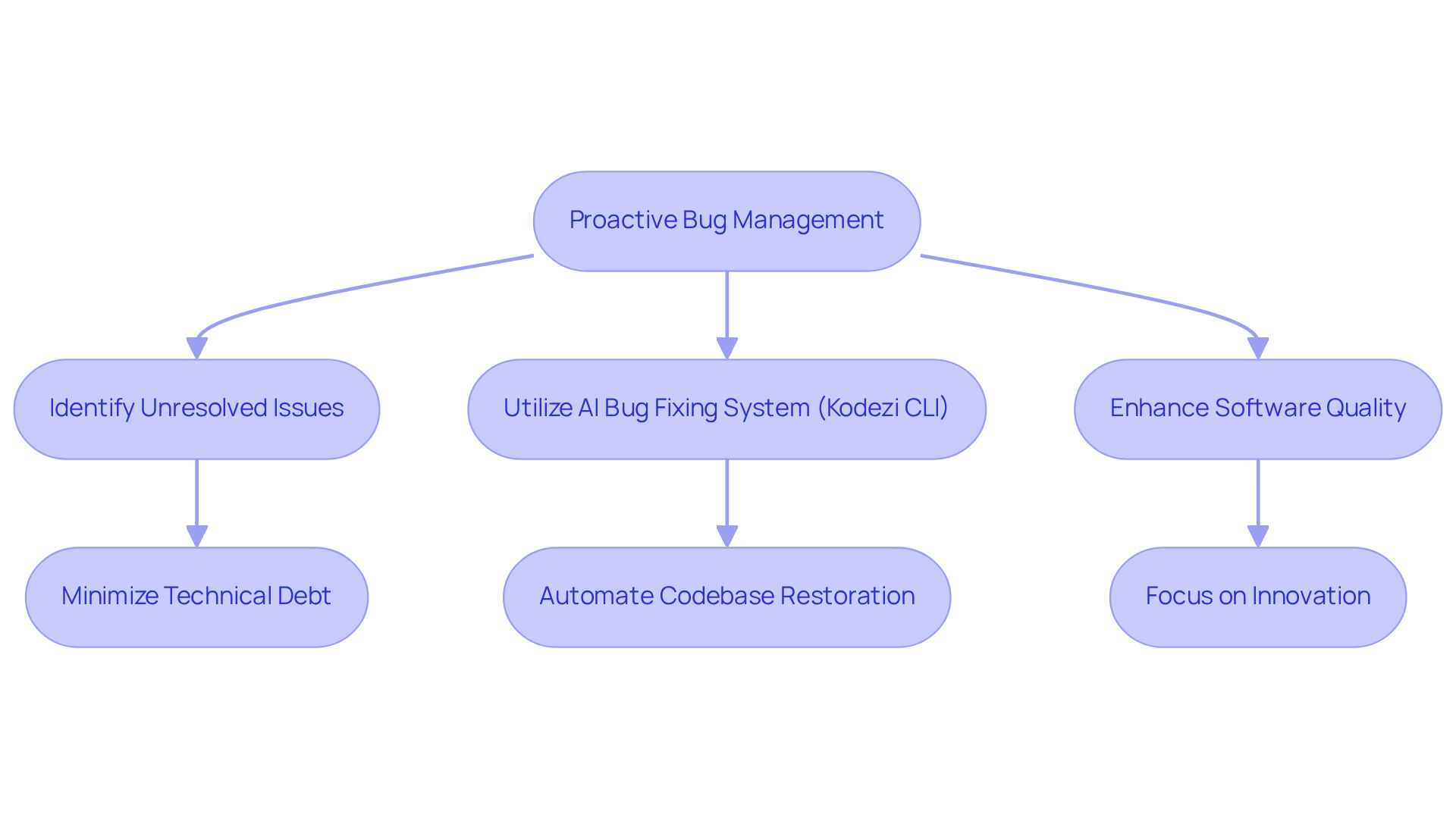
Scale Effectively: AI Bug Fixing Systems for Growing Development Teams
Coding challenges can be daunting for developers, especially as teams grow. An AI bug fixing system is essential for expanding development groups, providing the scalability needed to maintain quality as the group size increases. Kodezi automates numerous routine tasks related to bug fixing, enabling teams to expand their operations without compromising quality.
With subscription options priced at just $6.99 monthly, teams receive unlimited access to sophisticated features such as:
- OpenAPI YAML creation
- Real-time debugging
- Repository enhancement
Furthermore, user testimonials emphasize the effectiveness of the tool in enhancing productivity. For instance, Deven from MIT notes that it has significantly expedited his bug-fixing process.
This scalability guarantees that as teams expand, they can continue to effectively provide high-quality software through an AI bug fixing system. By utilizing Kodezi's powerful resources for generation, documentation, and transformation, developers can improve their productivity and code quality. Explore the tools available on the platform to see how Kodezi can transform your coding practices.
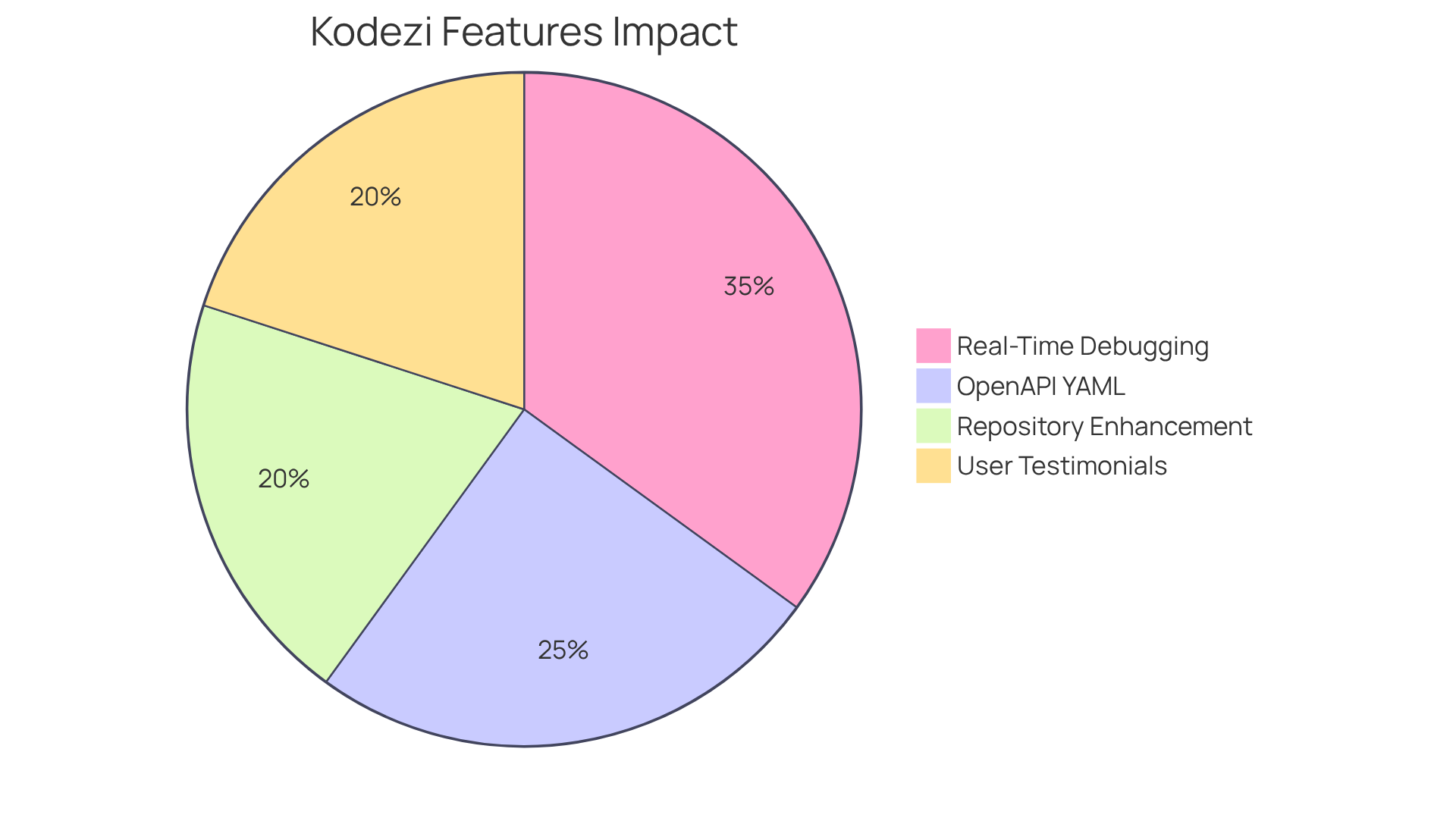
Boost Productivity: The Overall Impact of AI Bug Fixing on Development Success
Coding challenges are ever-present for developers, often hindering productivity and quality. The AI bug fixing system, such as Kodezi, addresses these obstacles by automating routine tasks, enhancing collaboration, and ensuring software quality. This software , allowing teams to focus on more complex challenges.
Kodezi automatically analyzes bugs, corrects code, and optimizes programming efforts across 30+ languages while supporting IDEs like Visual Studio Code. Furthermore, this automation leads to significant productivity gains. Studies indicate that generative AI boosts efficiency in tasks such as writing, summarizing, and coding, with an average productivity increase of 66% in programming tasks. In addition, AI adoption correlates with improved productivity and developer experience, with a 25% increase linked to a 2.1% rise in productivity.
As a result, project timelines are accelerated, enabling faster delivery of high-quality products. The integration of AI not only improves the final output but also increases satisfaction among developers and end-users alike. Industry leaders, including Ginni Rometty, emphasize that an AI bug fixing system like Kodezi is essential for maintaining competitive advantages in software development, as it enhances collaboration and alleviates the burden of repetitive tasks.
However, it is important to acknowledge that 88% of top AI users report experiencing burnout, highlighting the need for careful management of AI tool usage. By leveraging AI, organizations can achieve greater success in their development efforts, ultimately transforming their approach to software maintenance and evolution. Are you ready to explore the tools available on the Kodezi platform and enhance your coding practices?
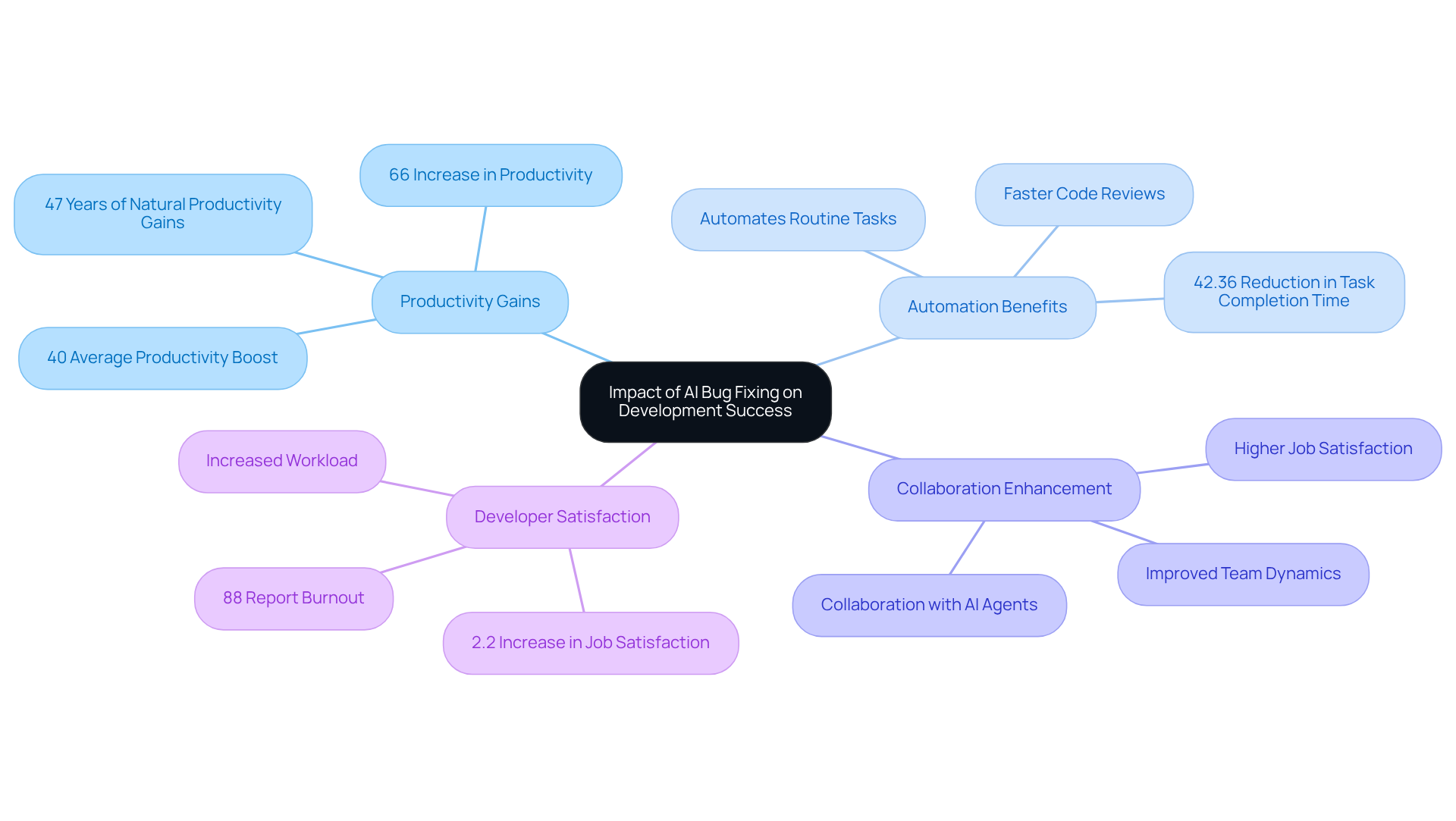
Conclusion
The integration of AI bug fixing systems, such as Kodezi, fundamentally transforms the landscape of software development. Developers often find themselves grappling with coding challenges that can hinder their progress. However, by automating the identification and resolution of these issues, Kodezi enables developers to concentrate on innovation rather than getting mired in debugging processes. This shift not only enhances productivity but also ensures higher code quality, leading to more reliable software products.
Key benefits of AI bug fixing systems, particularly Kodezi, include:
- The automation of routine tasks
- Improved team collaboration
- Proactive bug management
For instance, the ability to leverage historical data for predictive bug fixing empowers teams to address potential issues before they escalate. This proactive approach reduces technical debt and enhances overall software stability. Furthermore, the seamless integration of these tools into existing development environments ensures minimal disruption while maximizing efficiency.
Ultimately, embracing AI-driven solutions is vital for development teams aiming to maintain a competitive edge. As organizations increasingly adopt these technologies, they can expect significant improvements in productivity and code quality. The call to action is clear: explore the capabilities of AI bug fixing systems like Kodezi to not only streamline development processes but also foster a culture of continuous improvement in software engineering.
Frequently Asked Questions
What is Kodezi and what does it do?
Kodezi is a professional OpenAPI specification generator and an AI bug fixing system that automates the identification and resolution of coding issues, enhancing development efficiency and allowing developers to focus on more strategic tasks.
How does Kodezi improve coding efficiency?
Kodezi independently improves code quality by resolving bugs before they reach production, which accelerates the development process and guarantees high programming quality.
What features does Kodezi offer to manage code complexity?
Kodezi offers automated programming debugging features, entropy detection to uncover risk zones, and tools to address performance bottlenecks, security issues, and improve code formatting, leading to cleaner and more secure implementations.
How much time can Kodezi save in the debugging process?
Kodezi can reduce manual debugging time by up to 40%, allowing developers to focus more on feature development and innovation rather than just fixing issues.
What user feedback has been reported regarding Kodezi?
Users have reported that Kodezi allows them to find and fix bugs faster and more easily than traditional methods, with one user describing it as a "lifesaver" for correcting issues.
How do generative AI tools like GitHub Copilot and DeepCode compare to Kodezi?
Tools like GitHub Copilot and DeepCode also function as AI bug fixing systems, significantly increasing coding speed and streamlining debugging processes, similar to the capabilities offered by Kodezi.
Is there a way to try Kodezi before committing?
Yes, Kodezi offers a '5 minute quickstart' and a demo to showcase its features, allowing developers to experience its capabilities firsthand.




